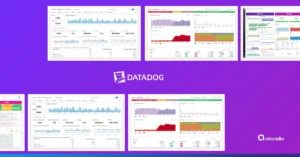Cyber Monday, Black Friday and Buen Fin are over, leaving behind the discount season, but with the Christmas holidays the shopping fever continues. So I think it’s a great time to analyze the role of AI in the world of e-commerce and how retailers can take advantage of this tool to optimize their strategies and boost the performance of their resources.
Although AI is not a new technology, it has experienced exponential growth in recent years, becoming a prominent trend on the rise.
Its adoption in multiple sectors, industries and aspects of everyday life has given rise to a wide range of conversations and debates ranging from its recreational use, concerns about the changes it entails, the promotion of its responsible and ethical use, and even controversies related to possible malicious uses of this technology.
This has led to the resistance of some sectors to adopt this technology for various reasons, such as fear of change, lack of resources, concerns about possible risks and even ignorance of the benefits. So we must remember that to achieve an efficient adoption of AI, it is necessary to carefully study the risks and benefits of this technology to integrate this tool intelligently.
You may be interested in: How to bring value to my company through Data Analytics?
It is therefore advisable to review the history of adoption of this tool, as well as the current landscape of the sector of our competitors, and to know the possible strategic allies in the process of adopting this technology.
With this in mind, I would like you to join me in this brief review of the role that AI has played in the retail sector, especially in e-commerce, which has become a vital branch for retailers today and will continue to play a decisive role in the future.
Ecommerce Evolution
Let’s go back a few years before the pandemic. E-commerce was already experiencing steady growth, especially among the younger population, a growth that was driven by the accessibility of the Internet, the popularity of mobile devices and the changing consumer habits of users.
Aware of this and of the advantages that this new channel entailed, such as continuous 24-hour availability or the elimination of the high costs of leasing physical premises, among others, they began to develop new strategies to take full advantage of this platform. .png)
However, this channel encountered resistance from other sectors of the population, not so immersed in the technological world and more accustomed to the usual purchasing channels, who among their reasons stated their fear of being swindled, their search for immediacy, the need for a recreational experience, among others.
Read also: Data migration through BigQuery and Google Cloud.
Although they would soon have to adapt to this way of shopping, thanks to the radical change experienced during the pandemic period, when the sanitary restrictions derived from the ravages of a previously unknown disease, limited social interaction as never before, as well as physical commercial operations, strengthening e-commerce, which would experience its greatest growth so far during this season.
Large retailers, which had long ago begun to improve their e-commerce strategy, benefited the most by turning the crisis into an opportunity for expansion, and brands such as Amazon, Mercado Libre and Wal-Mart positioned themselves as the favorite retailers among consumers.
Thanks to the shopping experience offered on its platforms, which filled the consumer with confidence, by offering protected payment formats, a wide variety of products, relevant recommendations and increasingly shorter delivery times, leaving the end consumer with a new acquired taste for online shopping. .png)
Taste that would continue even after the removal of the pandemic’s preventive restrictions, displacing preferences for physical shopping before the advantages discovered in online shopping channels, such as avoiding traffic, crowded places, shorter waiting times, great deals, and the comfort of doing all shopping from home.
Discover also: BigQuery: Transform your company into a Data Driven one.
By 2022, online sales in Mexico totaled 528 billion Mexican pesos (US$27,794 MDD) which represented an increase of 23% compared to 2021, this according to the Online Sales 2023 study of the Mexican Association of Online Sales (AMVO). Meanwhile, the bargain season accounted for 18% of total online sales.
While this year the e-commerce sales projection for Mexico was MXN $141,000 MDP (US$8,219 MDD), according to data from the Mexican Ministry of Economy.
AI as a Retail Catalyst
What is the role of AI in this whole story? The answer lies in the user experience, and the challenge of digital commerce was to offer an experience equal or superior to that of physical sales.
Taking into account that when you go shopping you can go directly for those products you need, besides taking a look at those products that catch your attention and consult your doubts with the sellers, know the seasonal promotions, compare prices and get your things with immediacy, the challenge was quite complex.
Given the high demand for game-balancing requirements, AI is beginning to gain ground in the field of digital commerce, starting at an early but ever-present and vitally important stage with AI-driven intelligent search engines. .png)
Whereas a conventional search engine is unable to understand the user’s purchase intent, returning irrelevant results or simply being unable to find the products requested, hindering the buyer’s journey and providing frustrating experiences. Intelligent search engines can even adapt to typos, natural language context and remember consumer preferences.
Check out: The Power of Marketing in the Data Driven Era.
In addition, AI-powered search engines can make intelligent recommendations according to the unique shopping patterns of each visitor, strengthening cross-selling, as well as being able to display the most relevant offers for each shopper, and provide comprehensive reports on recent search activity to enhance sales and marketing strategies.
An intelligent search engine is just the beginning; the scope of AI in e-commerce goes far beyond this. Knowing and understanding the buying preferences and behavior of users allows companies to obtain deeper and more complete insights to focus their attention on the areas that matter most according to each particular business, providing the opportunity to strengthen their operations by adjusting their strategy.
This translates into data-driven decision making that maximizes the performance and return on each investment, while economizing on operating expenses, a factor of great importance when it comes to competing with the titans of this sector, who seem to enjoy virtually unlimited resources.
AI, transforming retail logistics
Gathering high-quality, comprehensive insights is a key aspect, not only when creating personalized offers or marketing campaigns. User experience must be understood from a holistic point of view, looking at every little detail, from price comparisons, reviews from other shoppers, to product delivery times.
One of the key aspects for buyers is the reliability of products and sellers, thanks to the ability to rate and review them, the AI is able to assign scores and strategic positioning for each product, thus facilitating the buying process of each customer and strengthening confidence in the seller.
See also: User Intent: Understanding your users’ search intent.
Price comparison is another of those factors that consumers love about digital commerce. In addition to comparing the reliability of products based on shared experiences, users perform quick searches on different digital commerce platforms to find out the best price available..png)
An aspect where BI (artificial business intelligence) makes a significant difference, because by understanding the sales patterns in different seasons, locations and types of customers, it allows companies to manage their inventory intelligently, foreseeing market behaviors accurately with great anticipation, which translates into stock fulfillment.
This is because retailers can invest directly in those products that are in high demand, avoiding shrinkage of merchandise and optimizing storage space, thus reducing costs, as well as providing an advantage when conducting B2B negotiations to obtain the best commercial agreements and, therefore, provide more competitive offers to the end consumer.
Immediate delivery, IA reducing delivery times
Delivery times are another determining factor for buyers. We all want to receive our purchases as soon as possible, securely, conveniently and hassle-free. BI can provide a significant advantage, as demonstrated earlier this year by Mercado Libre, which broke records for delivery times of less than 24 hours, but what’s the magic behind it, the secret lies in predictability.
.png)
Optimizing logistics processes, BI analyzes purchasing patterns, providing detailed insights on pickup times, delivery, route duration, inventory and more. This has led to a remarkable record in delivery times, allowing the anticipation of shipment preparation according to AI-generated purchase predictions, stocking warehouses according to the type of purchases expected for each region.
Revolutionizing customer service, chatbots to say goodbye to frequently asked questions
One of the most complex and important processes in the retail sector is customer service, an essential part of the shopping experience, yet it is an activity that can be tedious and repetitive, as we can see from the multitude of memes related to the most frustrating aspects of this job.
You may also be interested in: Machine Learning: Future and mainstay of online stores?
Fortunately, AI is automating this process, freeing agents to concentrate on the more complex tasks, avoiding saturating them with the same questions over and over again, such as those regarding delivery times, return times, warranty terms and conditions with the supplier, etc.
This allows employees to attend to more personalized issues that require greater attention with better availability, which translates into a more comfortable and attractive shopping experience and work environment.
In addition to this, the most sophisticated chatbots allow the first contact with the customer to be established and a follow-up history to be maintained to prevent the consumer from having to experience the frustration of repeating their problem countless times.
So chatbots are undoubtedly an aspect that will continue to evolve in this sector.
Fraud and scams, a phantom threat to digital commerce
We have mentioned the importance of product and vendor reliability, however, as the e-commerce boom soars, the risks and threats are also growing, not only for users but also for distributors, with cybersecurity being the most important aspect for new and old competitors in the retail sector.
As well as AI provides positive aspects to this sector ranging from making investments more efficient, to reducing the burden on workers by keeping them focused on preparing products and shipments efficiently according to intelligent management. The malicious use of AI has also had significant repercussions in this sector, with fraud and scams being two of the most common threats.
Cybercriminals have made use of this tool to “clone” official sites with great speed and an almost undetectable verisimilitude at first glance, which manage to deceive users by taking advantage of their haste to buy. They have also evolved malware to steal sensitive data and compromise the integrity of retail platforms, thereby tarnishing the reputation of retailers.
For more information, see: 7 best practices to boost your eCommerce.
Fortunately, it’s not all bad news when it comes to AI in the cybersecurity arena, although cybercriminals are using AI to develop more sophisticated attacks. Cloud service providers, such as Google Cloud, have taken matters into their own hands and are implementing AI in the development of more effective cybersecurity solutions. .png)
Google Security Command Center is an example of this. This solution makes use of AI to detect threats in real time, taking actions to neutralize them and providing recommendations to inactivate the threat and strengthen the defenses of the digital environment to avoid falling victim to new intrusions in the future, helping companies protect themselves from the most sophisticated threats.
AI in retail, Advanced Implementation with Amarello
Now that you have a complete vision of the crucial role of artificial intelligence in the retail sector, all that remains is to discover your ideal digital partner to achieve an effective integration in your business. To minimize risks and maximize benefits, I invite you to consider Amarello as your strategic partner and reliable ally in the successful implementation of AI in your company.
With more than 15 years of experience in the IT sector, our expertise is strengthened. Our team of highly trained experts, certified with the most current knowledge in cloud technologies including AI, Machine Learnig, BI, Data Analytics and more, have contributed to build an outstanding client portfolio.
Among them, large retailers and financial institutions, with whom we have built outstanding success stories, which has earned us the 2023 Google Partner of the Year for Services award in Mexico and Colombia. This gives us the confidence to ensure that we are ready to provide your business with the best combination of solutions to fully exploit the potential of artificial intelligence in your business.
If you want to know more, take a look at: Double Victory: Amarello TI wins the 2023 Google Cloud Services Partner of the Year award for Mexico and Colombia.
Don’t wait any longer, schedule your personalized consulting and get ready to be the next leader of the bidding season. Also, take our Data Maturity Test to evaluate the level of readiness of your business to adopt a Data-Driven strategy. Additionally, remember that you can access the free demo of AntEater, the intelligent search engine that can increase your e-commerce sales up to 15%.
Don’t wait any longer and start transforming your business with AI and Amarello, your trusted ally! Follow us on social networks to stay up to date with the latest news to empower your business with IT.



